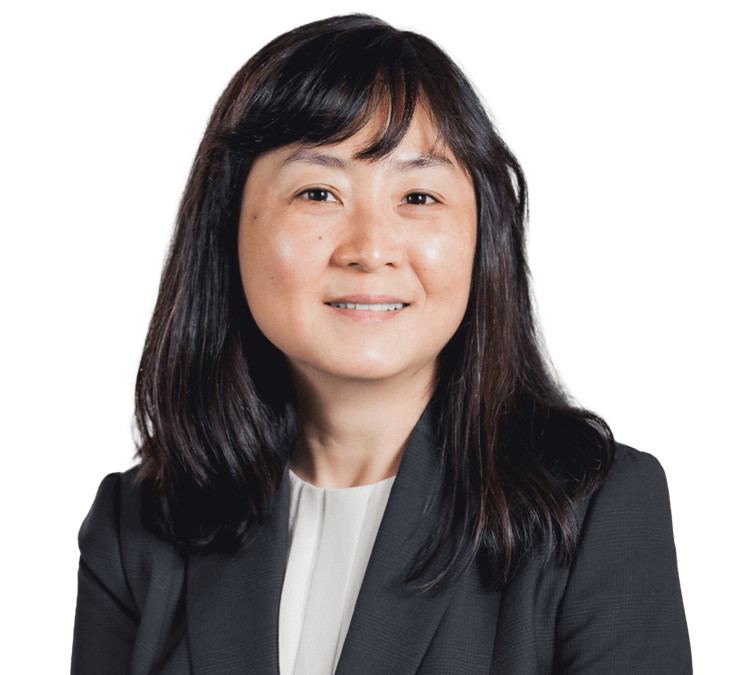Bin Wang, Ph.D., is a biologist-turned-attorney focusing her patent practices on biotechnology and pharmaceutical inventions.
Bin has represented biotech, pharmaceutical, and venture capital companies and academic institutions in patent drafting, prosecution, global portfolio development, and invalidity and non-infringement analyses. Bin has advised clients on numerous matters relating to oncology, immunology, cell biology, molecular biology, microbiology, and biochemistry, including matters in the following technology areas:
- Antigen-binding molecules, including diagnostic and therapeutic antibodies for oncology, infectious disease, autoimmune, and inflammatory indications
- Transgenic and gene therapy approaches
- CRISPR-based gene editing and epigenetic modifications
- Cell-based therapeutics using chimeric antigen receptor (CAR) cells, embryonic and adult stem cells, and erythrocytes
- Peptide vaccines
- Linear and circular RNA therapeutics
- Small molecule therapeutics, including hormones, kinase inhibitors, cytokine-modulating agents, and anti-aging agents
- Drug delivery across the brain-blood barrier
- Engineering and screening of drug delivery carriers, including adeno-associated viruses (AAV) and lipid nanoparticles (LNP)
- Fc CH3 heterodimerization platforms
- Methods of treating or preventing cancer, viral, bacterial, and fungal infections, autoimmune and inflammatory diseases, neurodegenerative diseases, ischemic stroke, bone marrow failure, preterm labor, mitochondrial neurogastrointestinal encephalomyopathy, uterine contractility disorders, and systemic endotoxemia
- Cellular Rejuvenation and Treating Age-related Degeneration
- Personalized medicine for cancer, neurodegenerative diseases, liver diseases, and traumatic brain injury
- High-throughput omics including single-cell genomics, RNA-seq, and proteomics, epigenomics, and microbiomics
- Ribosome profiling
- Protein nanowires
Bin Wang received her Ph.D. in Molecular Biology. She was a postdoctoral fellow at Stanford University, and a postdoctoral fellow and Research Assistant Professor at The University of Texas Health Science Center in San Antonio. Bin was a recipient of the Stanford University Dean’s Postdoctoral Fellowship, the NIH Individual National Research Service Award, and the American Heart Associate Early Career Award.
Dr. Wang is the author of over twenty peer-reviewed scientific articles in journals such as Nature, Nature Immunology, Cell, Development, Human Molecular Genetics, Journal of Biological Chemistry, Journal of General Physiology, American Journal of Physiology-Lung Cellular and Molecular Physiology, Molecular Psychiatry, Invertebrate Neuroscience, Experimental Biology, Neuroscience, European Journal of Neuroscience, and Frontiers in Physiology. Dr. Wang wrote two book chapters, one for Encyclopedia of Basic Epilepsy Research and the other for Ion Channels, Methods and Protocols.
Dr. Wang got her law degree from Baylor Law School, where she received Dean’s Academic Excellence Full Scholarship, Jim Barlow Memorial Award, Loy M. Simpkins Memorial Award, and Thomas M. Featherston, Jr. Estate Planning Award. In addition, she served as a judicial extern at The Eastern District of Texas with Magistrate Judge K. Nicole Mitchell.
Prior to joining the firm Bin served as a judicial extern at Law Clerk to The Eastern District of Texas, United States District Court Judge K. Nicole Mitchell. After completing her Ph.D., Bin was a Postdoctoral Fellow at Stanford University, a Postdoctoral Fellow and an Assistant Professor of Research at The University of Texas Health Science Center at San Antonio. Bin has been the recipient of many awards and honors, including the Dean’s Postdoctoral Fellowship from Stanford University, the Dean's Academic Excellence Full Scholarship, Jim Barlow Memorial Award, Loy M. Simpkins Memorial Award, and Thomas M. Featherston, Jr. Estate Planning Award from Baylor Law School, and NIH Individual National Research Service Award.
In 2023, Bin received distinction in Best Lawyers: Ones to Watch in AmericaTM for her patent law expertise.
Bin is the author of over twenty scientific articles and book contributions including: Development, Nature Immunology, Cell, Nature, Journal of General Physiology, Methods in Molecular Biology, American Journal of Physiology-Lung Cellular and Molecular Physiology, Molecular Psychiatry, Human Molecular Genetics, Invertebrate Neuroscience, Experimental Biology, Neuroscience, European Journal of Neuroscience, and Frontiers in Physiology. Bin wrote two book chapters, one for Encyclopedia of Basic Epilepsy Research and the other for Ion Channels, Methods and Protocols.
Bar Admissions
- U.S. Patent and Trademark Office
- Texas
Education
- B.S. in Genetics, Fudan University, Shanghai, China
- J.D., cum laude, Baylor University Law School
- Ph.D. in Molecular Biology, University of Texas
- Association of University Technology Managers (AUTM)
- American Bar Association, Member of Intellectual Property Law, Science & Technology Law, and Litigation Sections
- Member of the Biophysical Society; the American Heart Association
- Reviewer, Proceedings of the National Academy of Sciences of the USA, 2014; PLOS ONE, 2013



